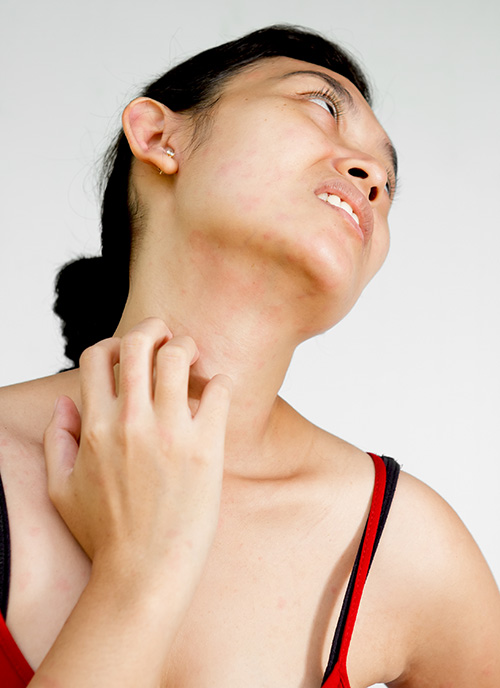Psoriasis And Eczema

Psoriasis is a long-term (chronic) skin problem that causes skin cells to grow too quickly, resulting in thick, white, silvery, or red patches of skin.
Normally, skin cells grow gradually and flake off about every 4 weeks. New skin cells grow to replace the outer layers of the skin as they shed.
But in psoriasis, new skin cells move rapidly to the surface of the skin in days rather than weeks. They build up and form thick patches called plaques. The patches range in size from small to large. They most often appear on the knees, elbows, scalp, hands, feet, or lower back. Psoriasis is most common in adults. But children and teens can get it too.
Having psoriasis can be embarrassing, and many people, especially teens, avoid swimming and other situations where patches can show. But there are many types of treatment that can help keep psoriasis under control.
Experts believe that psoriasis occurs when the immune system overreacts, causing inflammation and flaking of skin. In some cases, psoriasis runs in families.
People with psoriasis often notice times when their skin gets worse. Things that can cause these flare-ups include a cold and dry climate, infections, stress, dry skin, and taking certain medicines.
Eczema
Eczema is a term for a group of medical conditions that cause the skin to become inflamed or irritated. The most common type of eczema is known as atopic dermatitis, or atopic eczema. Atopic refers to a group of diseases with an often inherited tendency to develop other allergic conditions, such as asthma and hay fever.
Eczema affects about 10% to 20% of infants and about 3% of adults. some people continue to have symptoms on and off throughout life. With proper treatment, the disease often can be treated.
No matter which part of the skin is affected, eczema is almost always itchy. Sometimes the itching will start before the rash appears, but when it does, the rash most commonly appears on the face, back of the knees, wrists, hands, or feet. It may also affect other areas as well.
Affected areas usually appear very dry, thickened, or scaly. In fair-skinned people, these areas may initially appear reddish and then turn brown. Among darker-skinned people, eczema can affect pigmentation, making the affected area lighter or darker.
In infants, the itchy rash can produce an oozing, crusting condition that happens mainly on the face and scalp, but patches may appear anywhere.
The exact cause of eczema is unknown, but it’s thought to be linked to an overactive response by the body’s immune system to an irritant. It is this response that causes the symptoms of eczema.
In addition, eczema is commonly found in families with a history of other allergies or asthma. Also, defects in the skin barrier could allow moisture out and germs in.
Some people may have “flare-ups” of the itchy rash in response to certain substances or conditions. For some, coming into contact with rough or coarse materials may cause the skin to become itchy. For others, feeling too hot or too cold, exposure to certain household products like soap or detergent, or coming into contact with animal dander may cause an outbreak. Upper respiratory infections or colds may also be triggers. Stress may cause the condition to worsen.
The condition can be effectively managed with medical treatment and by avoiding irritants. It is not contagious and can’t be spread from person to person.

